Set of Zero-tolerance Policies in Compliance with RBA Code of Conduct
GIGABYTE commits to complying with local laws under high moral standards and obeying regulations of industrial responsibility. Although we are not a formal member of the Responsible Business Alliance (RBA, originally known as EICC), we voluntarily reference our practice with the RBA Code of Conduct, including aspects of labor, health and safety, environment, and ethics.
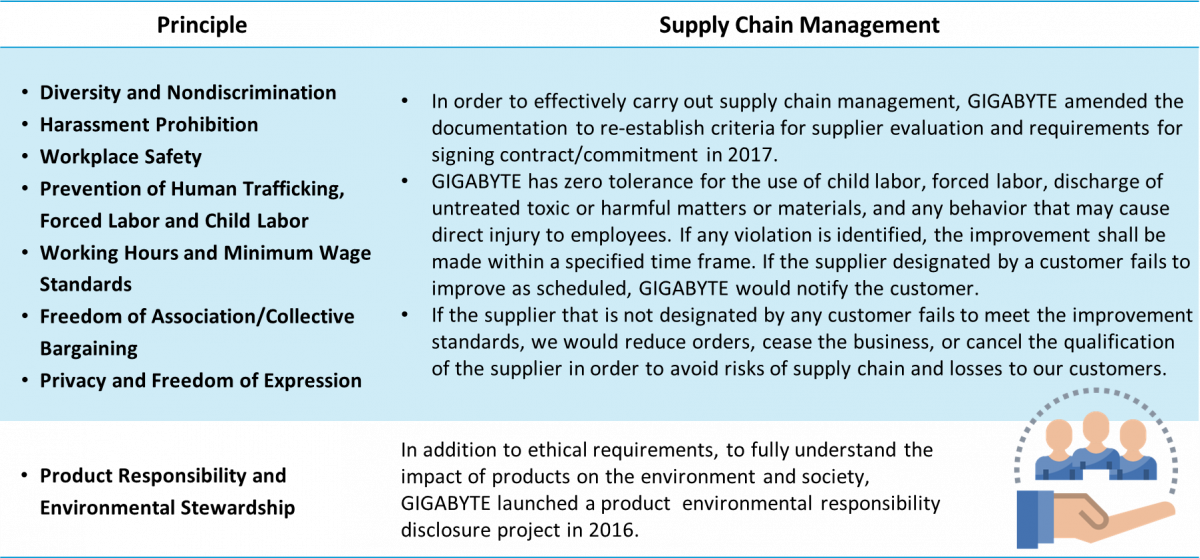
- For more information about the RBA, please visit the RBA website at http://www.responsiblebusiness.org/
- For more information about GIGABYTE product stewardship, please refer to Extended Product Responsibility.
Prohibition on Conflict Minerals
Tin, tungsten, tantalum, and gold (3TG) minerals are indispensable raw materials in electronic products. If these minerals are obtained from areas of forced labor, child labor, or armed conflict, they would be considered conflict minerals that oppress and harm local human rights and living conditions. Therefore, GIGABYTE reference with the Responsible Minerals Initiative (RMI) under the RBA to investigate the use of 3TG minerals by first-tier suppliers and gradually traces the source through the Conflict Minerals Report Template (CMRT6.4 and EMRT 1.3) to further manage raw materials to jointly safeguard human rights and values.
Investigation Process of Conflict Minerals
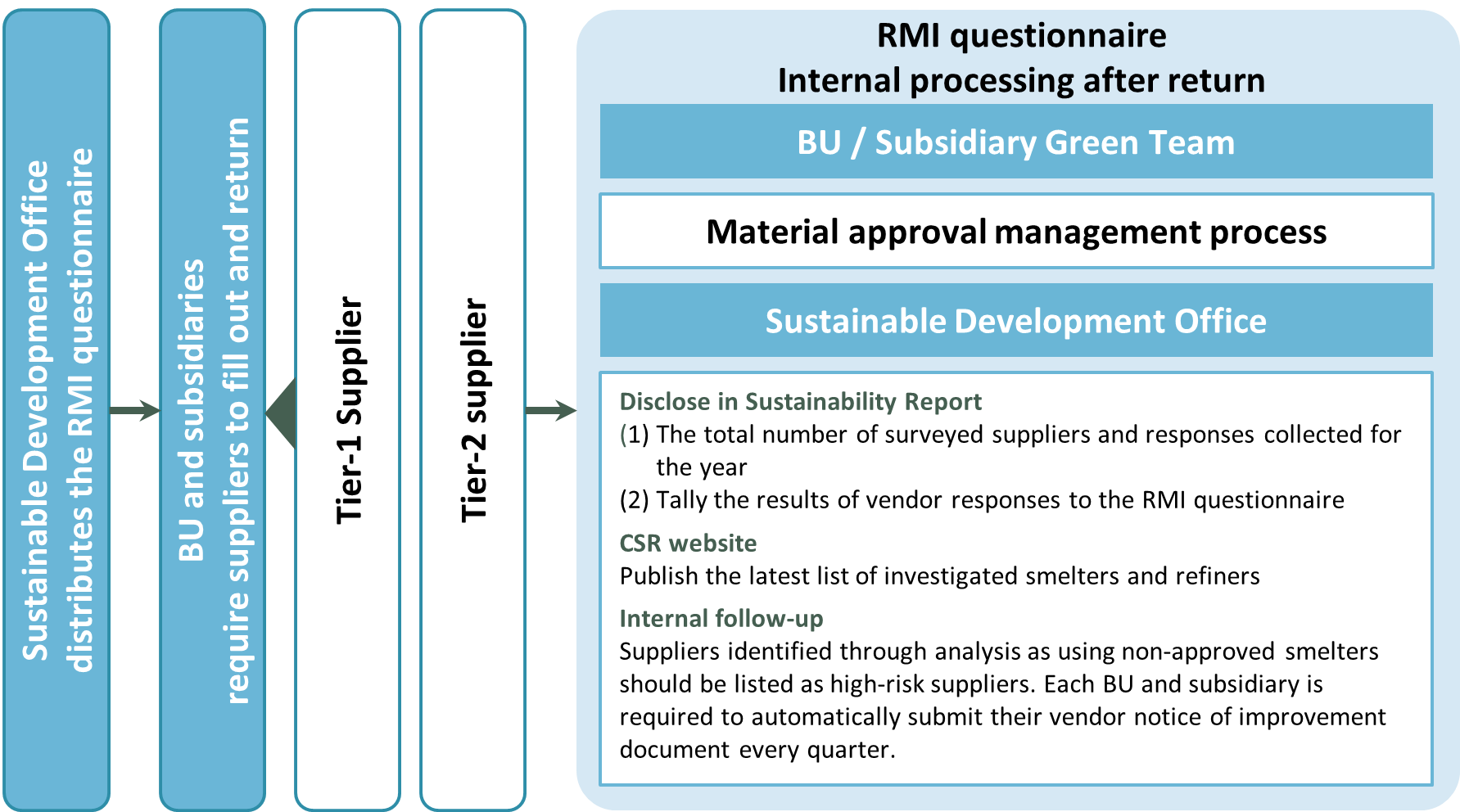
The number of suppliers included in conflict minerals investigation
| 2021 | 2022 | 2023 | 2024 | |
|---|---|---|---|---|
| Number of Investigated Suppliers | 503 | 326 | 508 | 483 |
| Number of Suppliers Completing Follow-up Improvement | Not implemented | Not implemented | 17 | 4 |
Note 1: The number of surveyed companies is determined by the number of questionnaires sent out. Different business groups and subsidiaries may purchase materials and parts from the same suppliers, but those materials and parts are managed in different product lines. In these cases, shared suppliers will still be counted repeatedly.
Note 2: The number of suppliers completing follow-up improvement counts the suppliers who have replied with improvement measures to GIGABYTE after their upstream smelters have been identified as needing improvement in the year and have completed the improvement.
Geographic Distribution of Smelters and Refiners
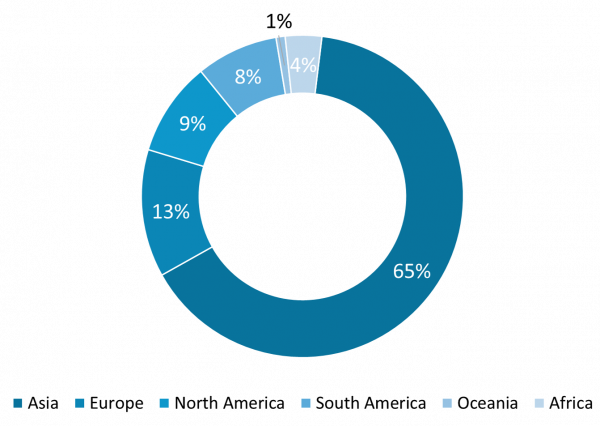
Conflict Minerals Investigation in the Past Four Years
In 2024, GIGABYTE conducted its annual due diligence, achieving an overall response rate of 90%. According to the survey results, GIGABYTE sourced from a total of 483 smelters of 3TG, cobalt, and mica, primarily located in Asia, followed by Europe. Among them, 470 smelters were deemed compliant, accounting for 97.3%. The remaining 13 non-compliant suppliers included 10 related to 3TG and 3 related to cobalt and mica. For suppliers suspected of using non-compliant smelters, immediate discontinuation is enforced if the materials are non-designated. For designated materials, suppliers are required to make improvements or provide alternative sourcing solutions within 90 days, with progress tracked by responsible personnel.
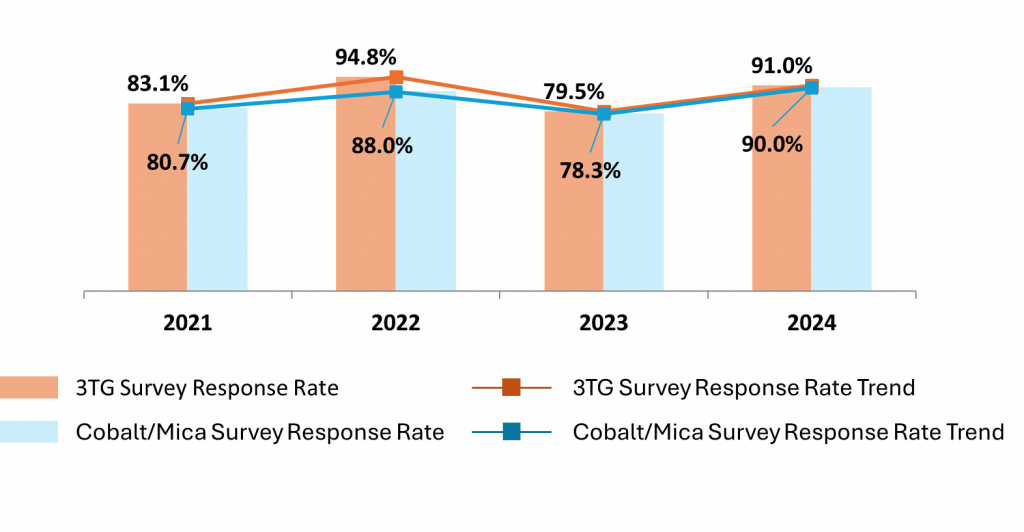
In 2024, 87% of GIGABYTEʼs top 100 critical component suppliers by purchasing volume had established conflict minerals management mechanisms, representing a 20% increase compared to the previous year. GIGABYTE will continue to emphasize the importance of responsible mineral sourcing through supplier engagement and compliance requirements, with the goal of expanding implementation across the supply chain and supporting the protection of fundamental human rights. GIGABYTE will continue to expand the scope of cobalt investigation to eliminate human rights oppression caused by conflict minerals.
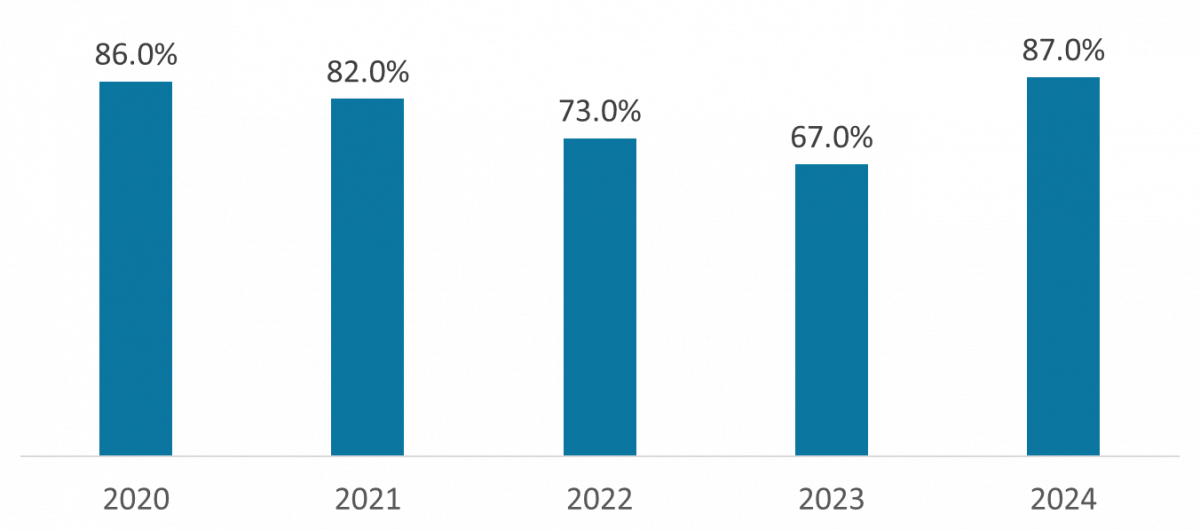
3TG Minerals
GIGABYTE identified a total of 352 3TG Minerals smelters in 2024, among which 342 were verified as compliant, resulting in a compliance rate of 97%. In 2024, one supplier successfully removed six non-compliant smelters under GIGABYTEʼs guidance. The Company continues to monitor and urge the remaining suppliers to implement necessary improvements.
Summary of 3TG Smelter Survey Results over the Past Four Years

Cobalt Mineral
GIGABYTE identified a total of 131 cobalt and mica smelters in 2024, among which 128 were verified as compliant, resulting in a compliance rate of 97.7%. For the three smelters deemed non-compliant, GIGABYTE has issued improvement requests and confirmed that corrective actions have been implemented.
Download the List of Smelters of GIGABYTE Supply Chain
- Home
- Innovation Management
- The Guanxi Blue Zone
- The Ocean is Our Home
- From the Chairman
- Commitment to CSR
- Stakeholder Engagement
- Material Topics
- SDGs
- Corporate Organization
- Code of Conduct
- Information Security & Privacy
- Risk Management
- Supply Chain Management
- Tetralogy of Supply Chain Engagement
- Conflict Mineral
- Environmental Management Policy
- Brand Strategy and Business Reputation Management
- Climate Strategy and Risk Management
- Customer Relations Management
- Eco-friendly Product
- Extended Product Responsibility
- Biodiversity
- Circular Economy
- Green Action
- Sustainability/Environmental Education
- Green Activities
- Working Holiday
- Corporate Volunteering
- Go Green Taiwan
- Make Earth Green Again
- Tree Map
- Overview/Core Concept
- Rooftop Farm
- Ecology Photo Competition
- Resource Hub
- Diverse and Inclusive Workplace
- Talent Management
- Human Rights Management
- Talent Cultivation and Development
- Occupational Safety
- Health Care
- Upgrade Your Life
- Social Inclusion
- CSR Milestone
- Economic Aspect
- Environmental Aspect
- Social Aspect
- CSR Report
